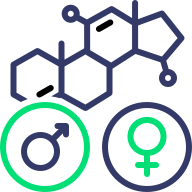Fibroids
Fibroids are very common and can affect 20% of women over the age of 30.
Fibroids can cause heavy bleeding, painful periods and increase risk for fertility issues. Sometimes fibroids have no direct symptoms but women can experience dragging sensations, frequent urination, backache or constipation. Fibroids seem to run in families, which may indicate a genetic susceptibility.
Key Facts
- Fibroids respond to your oestrogen levels and xenoestrogens (chemicals in our environment)
- Regular blood tests do not always give sufficient information about hormones. We use functional medicine tests such as the DUTCH comprehensive hormone test to personalise protocols
- Phytoestrogens in foods and supplements may help to balance oestrogen effects. Diet and supplements can help to reduce growth of fibroids and long-term management
- Your liver is extremely important in detoxifying and removing excess oestrogen. Liver pathways can be measured and modified via diet and supplements
- Fibroids can run in families, which may indicate a genetic susceptibility. Genetic testing of oestrogen pathways and detoxification can identify where longer term support may be needed
- Oestrogen elimination via the bowel can be modified by gut bacteria so a healthy gut microbiome is key
Best Test Options
Patient Story
History
Molly attended our clinic previously for help with IBS and digestive issues. While many of her symptoms had improved, she still had bloating and a ‘dragging sensation’ in her abdomen which she could now tie to her menstrual cycle. We recommended that she attend a gynaecologist for a scan and she was diagnosed with multiple large fibroids. The recommendation was for surgical removal though there was a waiting list. Molly decided to do all she could naturally to support her own health and to reduce the risk of re-growth after the surgery.
Tests
Molly carried out a DUTCH comprehensive hormonal analysis test. Her levels of oestrogen were very high which were likely promoting growth of fibroids. Molly was also poorly detoxifying her oestrogen, which meant that the high levels were compounded by it slowly leaving the body instead of being properly managed.
Plan
Molly had previously been unable to tolerate much fibre but since her IBS issues were improved, she now introduced pulses and fibres that help to support removal of excess oestrogen through the digestive tract. She also increased her intake of cruciferous vegetables to support liver detoxification of oestrogen. As long-term management was important, a supporting supplement protocol was recommended but the major focus was on long term dietary changes. She also reduced at her exposure to xenoestrogens in her environment.
Outcome
Molly had surgery to remove the fibroids, which was successful. She is hoping to manage her oestrogen levels naturally over the coming years to preserve her health and her fertility. She will attend for regular scans.
“I was really concerned about my diagnosis. I’m so glad to know there are things I can do that might help. I wanted to do everything I could to help naturally.”




